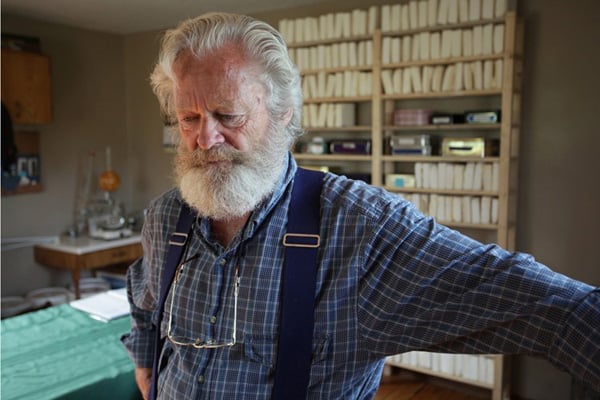Wiebo Ludwig is a farmer and a fundamentalist. PR guy doesn't figure on the resume.
Throughout his long battle with the Alberta energy industry over sour gas wells near his property, Ludwig has at times been his own worst enemy, making statements that reliably alienate public opinion. Nor does it help that Ludwig and his tight-knit clan of Bible separatists have espoused beliefs on gender roles that make Saudi Arabia look progressive. But considering the issues at the heart of the dispute, it's a shame the central figures weren't running an orphaned puppy shelter. They deserve the love. David York's new documentary Wiebo's War makes clear there is plenty of reason to sympathize with Ludwig's cause. You can catch the film at the Vancity theatre various times in the coming week starting tonight, Oct. 21.
Perhaps inevitably, York's documentary starts from a first-person perspective as he records his initial meetings with the Alberta clan that formed in 1985 around the families of Ludwig and Richard Boonstra. York is an atheist, a fact that provokes both anger and mistrust from his intended subjects -- one of the group claims York has "no right" to deny the existence of God. We don't see how that was smoothed over. But the cameras keep rolling, so it would seem the parties made peace over a common interest. Ludwig and Co. want their story told. And they do have one to tell.
Those of us who grew up watching The Beverley Hillbillies -- reminded weekly of how Jed Clampett got rich from finding oil on his property -- are often taken aback to find it doesn't work that way around here. Landowners have no claim to minerals, oil, and gas beneath their topsoil. It belongs to the government. So one day the peaceful Ludwig commune was informed that sour gas wells were coming to their rural 'hood, and they had no say in the matter. Trouble started soon afterward. Farm animals began miscarrying, and so did commune members. Coincidence? Possibly. But the families were eventually informed that there had in fact been a deadly gas leak from the well at the edge of their property. And pretty soon they were able to record a remarkable trick on video -- setting their own tap water on fire. Soon the RCMP were investigating a series of incidents at local wells -- one cemented, others blown up. Ludwig expressed sympathy for the cause but admitted nothing. The RCMP began watching the farm and tailing commune members.
When hearing the Ludwig story, emotion and reason may pull in different directions. The vast majority of those who view Wiebo's War will unavoidably see him as a heroic modern-day bandit, battling the evil titans of petroleum. But would people be as sympathetic if the fundamentalist Ludwig decided that bombing abortion clinics was also legit? Unless you are willing to embrace terrorism as a legitimate form of protest, it is difficult to defend the bombing of legal enterprises. And yet, the injustice is palpable. Most egregious is the RCMP attempt to infiltrate the clan via an undercover operative. After their own man bombs a gas facility, the RCMP point the finger at Ludwig, even holding a town hall meeting where an imported expert compares the group to the Japanese poison gas cult and even mass murderer Jim Jones.
It would take a near-robotic impartiality not to cheer as the Ludwig clan fights back against the Oil and Gas Man. So why is Ludwig so widely disliked?
One reason is that his neighbours have a vested interest in petroleum exploration. They may not own the rights, but they do get jobs, as well as cash from providing access roads. But another reason is Ludwig himself.
The only confirmed fatality in this battle is 16-year-old Karman Willis. Riding in a car full of apparently drunken teens burning doughnuts on the Ludwig property in the early hours of June 20, 1999, Willis was shot by a person unknown. In the wake of the tragedy, Ludwig chastised reporters for focusing on the teenager's death, insisting it was not the main issue. This startling display of callous self-righteousness, replayed in Wiebo's War, provided plenty of cover to anyone predisposed to hate and fear its source.
If Wiebo's War has any fault, it is in York's decision to sidestep some of Ludwig's more disturbing beliefs and appalling statements. Once, after arguing with his mother about what Ludwig felt was his insufficiently strict Christian upbringing, he rebuffed an attempted reconciliation by saying: "I'd sooner hug a prostitute."
Andrew Nikiforik was also accused of downplaying Ludwig's unsavoury side in his 2000 book Saboteurs: Wiebo Ludwig's War Against Big Oil. But Nikiforuk did detail some of Ludwig's more extreme beliefs and statements. And he said of Ludwig: "He thrives on conflict."
The Ludwig case has demonstrated what can happen when the interests of unsuspecting individuals clash with those of corporations and government. Yet the case is equally fascinating for its emotional, political, and legal conflicts. Wiebo's War and the entire Ludwig story test our ability to hold conflicting ideas simultaneously, and find our way past emotion and prejudice to justice.
York talked with The Tyee recently. Here's some of what he had to say...
On how long it took Ludwig, Boonstra and the rest to overcome their misgivings about his atheism -- at least enough to do the film:
"It took about nine months. Later, Wiebo's wife Mamie said that the family thought that I was an undercover police office at first. Understandable, given the fact that they had a paid informant planted in their midst, and their years under surveillance. The more substantial reservation was their reluctance to share their story with an atheist. We resolved this, as the Ludwigs resolved to cast their bread upon the waters... but this was a problem that never entirely went away. In fact, it prompted the family to end their participation in the film on a couple of occasions."
On how he felt about Ludwig's little community when his time with them was over:
"It is an extraordinary community. The family members are bright and inquisitive. They have strong opinions and aren't afraid to share them, or disagree with Wiebo Ludwig. They function at a very high level, both as farmers and as a thinking, purposeful community. We have our differences, especially in regards to religion, and some of the tactics they have employed over the years... but after all they have been through, I can't judge them harshly."
On whether he is still in contact with them:
"Yes. Nine family members will attend a screening in Edmonton on Saturday, Oct. 22 at the Metro."
On whether Ludwig's clan have seen the film:
"Yes. They think it is fair, although elements of the film make members of the family uncomfortable."
On whether Ludwig is his own worst enemy in terms of his public image:
"Wiebo's public image is not entirely of his own creation. People know him through media coverage of events such as the bombings, arrest and trial -- times when everyone is under a lot of pressure, and stakes are very high. Wiebo can sometimes be a little mischievous and playful with, and maybe manipulative of, the press. This has not helped the public view of him, especially in the context of loaded situations, and willful vilification of Wiebo by industry and law enforcement."
On whether, given that his film definite evidence of RCMP misbehaviour including a bogus bombing, the RCMP were justified in making a serious attempt to deal with what they considered terrorism against a legitimate business:
"Of course. Bombings are dangerous and illegal."
On whether there are steps drilling companies could take to reduce the risk to nearby residents:
"Yes. The most severe threats to human and animal health are in utero, and the most dangerous time is during the initial test drilling period -- usually 30 days or so, before the well is properly sealed and before the pressure and nature of the gas (what percentage sour) is known. It seems clear to me that the oil and gas industry has a responsibility to protect those downwind of the well sites at this most vulnerable time. Long-term low-level health effects are a more difficult but less immediately grave issue."
On whether landowners should also own mineral rights:
"I believe that landowners should make every attempt to acquire those rights... but the system of surface and subsurface rights goes back centuries to English common law. Unravelling this would be difficult, and would be a major challenge for both governments (fiscally, legally) and industry. Probably not a practical aim."
[See more Tyee stories in: Film.] ![]()
Read more: Film, Environment
















Tyee Commenting Guidelines
Comments that violate guidelines risk being deleted, and violations may result in a temporary or permanent user ban. Maintain the spirit of good conversation to stay in the discussion.
*Please note The Tyee is not a forum for spreading misinformation about COVID-19, denying its existence or minimizing its risk to public health.
Do:
Do not: